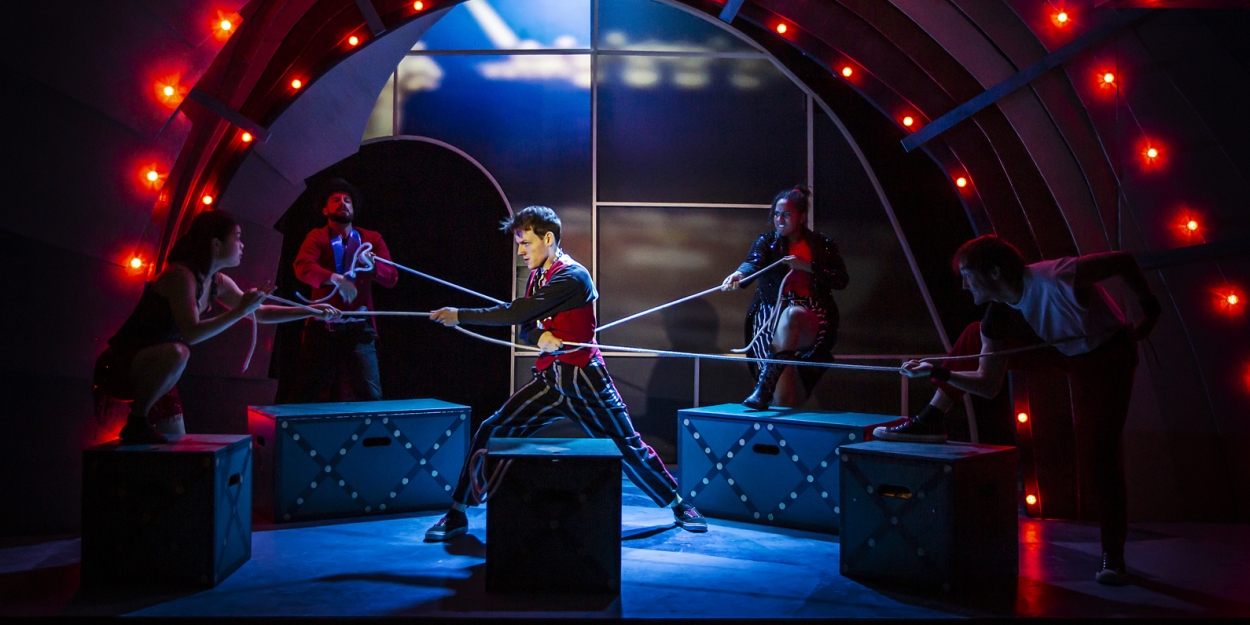Review: A-TYPICAL RAINBOW, Turbine Theatre
Autism, aeroplanes and Anne Widdecombe.

![]() Starring and written by JJ Green, A-Typical Rainbow has a particular mission: to give the audience a mind's eye view of what it was like for him to be an autistic child and young man. For better and for worse, it very much succeeds in its mission.
Starring and written by JJ Green, A-Typical Rainbow has a particular mission: to give the audience a mind's eye view of what it was like for him to be an autistic child and young man. For better and for worse, it very much succeeds in its mission.
In his debut as a playwright, Green (here named Boy) initially takes us back to himself as a seven-year-old born to parents who struggle to understand and cope with his behaviour, habits and (in his father's eyes) his effete attachment to a doll. Inside his head, Boy lives in fantastically vivid worlds where he swims with mermaids, runs with wolves and flies with dragons; in the real world, he struggles to be accepted at school and by his father.
Even those familiar with autism through the Mark Haddon's book Curious Incident Of The Dog In The Night Time, its stage adaption by Simon Stephens or Netflix's similarly-named Atypical will gain further insight from this play. Green, with no small amount of detail and through repeated metaphors, goes deep into various concepts which he struggled with as a child. He finds non-answers and uncertainty difficult to deal with and disagrees in particular with the word "maybe" which he excoriates through the example of an aeroplane journey skit.
His struggles with distinguishing the literal from the figurative is shown through a conversation where he states how he took his mother at her word when she said it would be raining cats and dogs and thought it would be an opportunity to gain a pet.
A-Typical Rainbow succeeds best when looking at Boy's early relationships with his parents, school friends and (through his mother) his doctor. His father (a dynamic James Westphal) wants his son to be a "normal" boy he can take to football matches and worries for Boy's future while the consultant (also Westphal) prescribes the controversial technique of Applied Behaviour Analysis. Later, Boy leaves his parents behind, literally running away with the circus where he finally finds acceptance, friendships and love.
One of the true joys of this play is the way Green uses language through his own character and others. His mother sees and loves him for what he is ("He has worlds in him...he's the pot of gold at the end of the rainbow") and is wonderfully played by Caroline Deverill (herself the mother of an autistic son). His teacher is described as "writing like a supercomputer - no wonder she has arthritis", his aftershave smells "musty like Anne Widdecombe's crotch" and, in the most emotionally impactful scenes, he uses colour (particularly orange and red) to explain the intensity of his emotions.
For better and worse, this play is true to itself and its mission. While providing a superlative experience of being autistic, some parts are overlong, repetitive or simply unnecessary in explaining the story while scenes like those around Boy's first relationship are rushed and could have done with more elucidation. It may have been better for this aspect to be given room to breathe in a sequel rather than being introduced partway through the second half of this play.
A-Typical Rainbow's 140-minute runtime seems excessive and occasionally indulgent but there's no denying its emotional power and its kaleidoscopic depiction of a condition which is still much misunderstood.
A-Typical Rainbow continues at Turbine Theatre until 8 August.
Photo Credit: Pamela Raith
Reader Reviews
Videos

